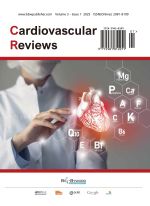Abstract
Objective: To study the changes and clinical effects of elderly patients with coronary heart disease and chronic heart failure after applying individualized cardiac rehabilitation. Methods: 85 cases of elderly patients with coronary heart disease and chronic heart failure admitted from June 2023 to May 2024 were divided into the control group (42 cases) and the experimental group (43 cases), and were given conventional rehabilitation guidance and individualized cardiac rehabilitation training programme respectively, comparing the indexes of exercise endurance, level of cardiac function, quality of life, and incidence of adverse cardiovascular events in the two groups. Results: Before intervention, the LVEF, LVEDD and LVEDS of the control group and the experimental group were (37.11 ± 3.96)%, (62.15 ± 4.06) mm and (45.75 ± 4.33) mm and (37.06 ± 3.92)%, (2.20 ± 4.23) mm and (45.81 ± 4.27) mm, respectively, with no statistically significant difference. and test group LVEF increased and LVEDD and LVESD decreased by (45.75 ± 5.12)%, (55.18 ± 3.97) mm, (41.14 ± 3.29) mm and (51.79 ± 4.26)%, (48.23 ± 3.58) mm, (36.62 ± 3.75) mm, respectively, with statistically significant differences between the groups (P < 0.05) ). Before intervention, the 6 min walk test (6MWT) and maximum exercise load of the control group and the experimental group were (325.55 ± 37.79) m, (91.02 ± 15.74) W and (324.17 ± 37.68) m, (90.92 ± 14.78) W, respectively, and the difference was not statistically significant (P > 0.05). After intervention, all the indicators of both groups were significant (P > 0.05). After the intervention, all indicators in both groups were significantly higher, respectively (386.28 ± 42.95) m, (135.67 ± 22.75) W and (460.43 ± 39.91) m, (152.83 ± 25.64) W, and the difference between the groups was not statistically significant (P < 0.05). The quality of life scores of the experimental group on somatic symptoms, daily activities, psychological quality, and social functioning were respectively (80.01 ± 6.02), (73.75 ± 7.32), (80.56 ± 6.41), (71.42 ± 6.87), significantly higher than the control group’s (67.03 ± 6.98), (64.19 ± 7.16), (63.78 ± 6.13) and (60.72 ± 6.47), while the difference was statistically significant (P < 0.05). Cardiac arrhythmia occurred in the experimental group. The incidence of adverse cardiovascular events such as myocardial infarction was 4.65%, which was significantly lower than that of the control group (23.81%), and the difference was statistically significant (P < 0.05). Conclusion: Individualized cardiac rehabilitation exercise in elderly patients with coronary heart disease and chronic heart failure can promote the recovery of clinical symptoms, improve cardiorespiratory function, enhance exercise endurance, improve the quality of life, and effectively improve the prognosis.
References
Liu H, Li L, Wang S, et al., 2022, Effects of Cardiopulmonary Exercise Test-Guided Cardiac Rehabilitation Combined with Positive Cognitive Therapy on Cardiopulmonary Function, Anxiety and Depression, and Prognosis in Elderly Patients with Chronic Heart Failure. Modern Biomedical Progress, 22(10): 1851–1855.
Chen L, Li S, Chen J, 2023, Effects of Adding Inspiratory Muscle Training to Cardiac Rehabilitation on Inspiratory Muscle Strength and Cardiopulmonary Function in Patients with Chronic Heart Failure. Journal of Clinical and Experimental Medicine, 22(20): 2153–2157.
Wei F, Li J, Sun Q, et al., 2021, Continuity of Care Combined with Cardiac Rehabilitation Exercise Training in Patients with Coronary Artery Disease Combined with Heart Failure with Preserved Ejection Fraction. China Clinical Research, 34(8): 1145–1147.
Zang D, Wu Y, 2021, Clinical Study on the Effect of Yiqi Diarrhoea Lung Water-Elimination Method Combined with Cardiac Rehabilitation Exercise Therapy on Cardiac Function in Patients with Coronary Heart Disease and Heart Failure. World Journal of Integrative Medicine, 16(10): 1896–1899.
Fan QJ, Li J, He J, et al., 2019, Study on the Effects of Cardiac Rehabilitation Exercise Training on Cardiopulmonary Function, Exercise Capacity and Cardiac Autonomic Function after Percutaneous Coronary Intervention in Patients with Coronary Artery Disease. Journal of Practical Heart, Cerebral, Pulmonary and Vascular Diseases, 27(11): 6–10.
Bu Z, 2021, Observation on the Effect of Cardiac Function through Cardiac Rehabilitation Training after PCI in Patients with Stable Angina Pectoris with Chronic Coronary Heart Disease. Cardiovascular Disease Prevention and Treatment Knowledge, 11(2): 50–52.
Avram RL, Nechita AC, Popescu MN, et al., 2022, Functional Tests in Patients with Ischemic Heart Disease. Journal of Medicine & Life, 15(1): 58–64.
Ma J, Xiong S, Fang W, et al., 2020, Effects of Comprehensive Cardiac Rehabilitation Management on Exercise Tolerance and Quality of Life in Elderly Patients with Stable Coronary Artery Disease. PLA Journal of Preventive Medicine, 38(12): 20–22.
Wang J, Wang X, Jiang C, et al., 2021, A Study on the Effect of Individualized Cardiac Exercise Rehabilitation Training on the Score of Quality of Life Measurement Scale in Elderly Patients with Heart Failure. Shanxi Medical Journal, 50(12): 1994–1997.
Zhang Y, Xu Y, Liang Y, et al., 2022, Effects of Individualized Cardiac Exercise Rehabilitation Training Combined with Simple Tai Chi Training on Cardiopulmonary Function, Psychological State and Quality of Life in Patients with Stable Chronic Heart Failure. Modern Biomedical Progress, 22(11): 2057–2060.
